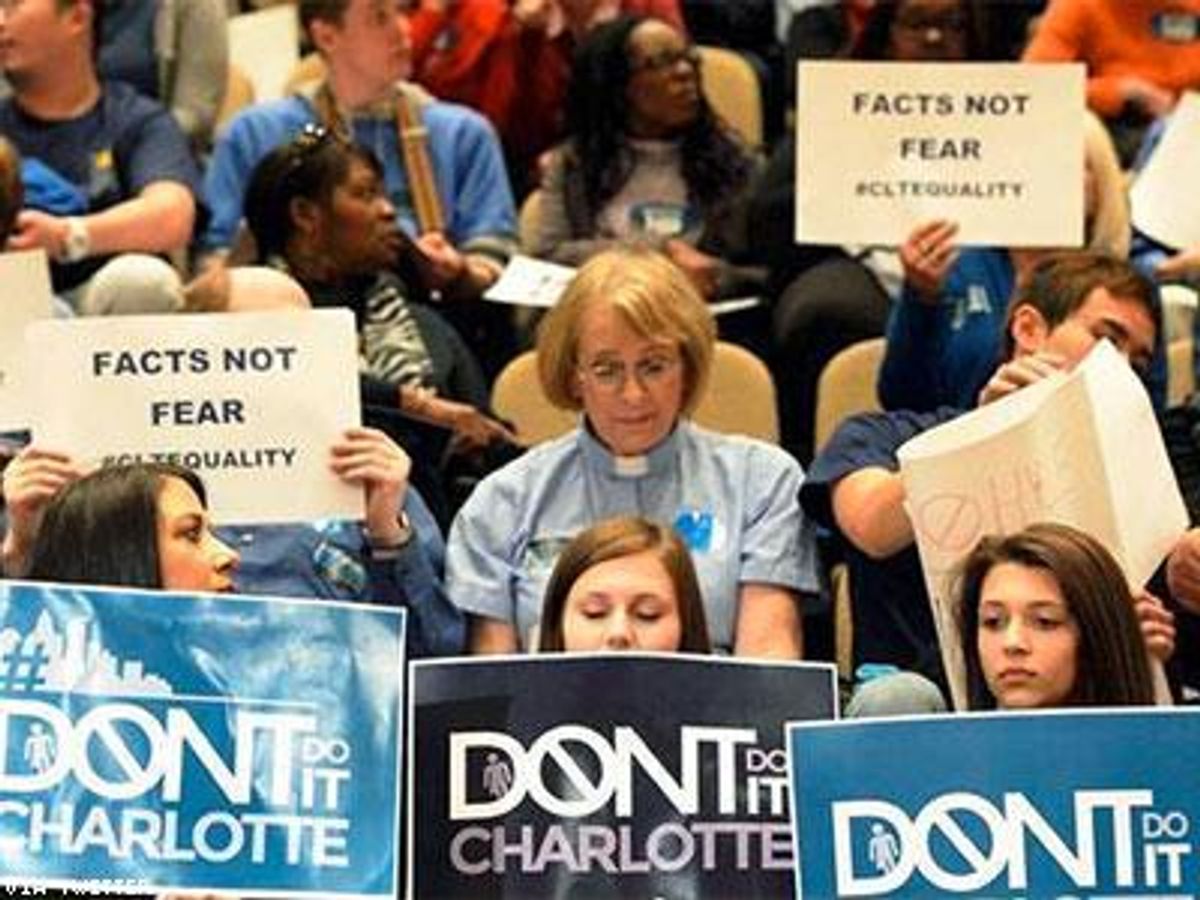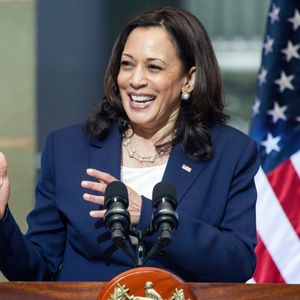At Charlotte-Mecklenburg Government Center city bathrooms Monday night, anti-LGBT protesters were practicing what they preach.
At least two trans women were accosted while attemping to leave the women's restroom during a contentious city council debate on an LGBT-inclusive nondiscrimination ordinance, reports Charlotte LGBT newspaper Qnotes. The newspaper's editor, Matt Comer, spoke with a 17-year-old trans girl named Olivia who was confronted by Flip Benham, a vehement Charlotte preacher, who Comer reports has previously been convicted of stalking a local abortion doctor.
Olivia told Qnotes that none of the other women in the bathroom seemed to take an issue with her presence, but once she exited the restroom she was stopped by Benham, who called her a "young man," "punk," and "pervert," and claimed she was endangering children by using the bathroom. Olivia yelled insults back, then walked away when her mother stepped between her and Benham. Another trans woman, Janice Covington Allison, later told Qnotes that she, too had been stopped by protestors.
After nearly five hours of often heated public testimony and the removal of some protections for trans residents, the nondiscrimination ordinance failed in a 6-5 vote. The ordinance sought to add sexual orientation and gender identity to the city's list of classes protected from discrimination in public accomodations and businesses.
The proposed ordinance -- which is similar to nondiscrimination ordinances in place in cities and some states throughout the country -- would have ordered, for instance, that hotels, taxi drivers, and vendors not deny service to anyone on the basis of sexual orientation or gender identity, lest the vendor or business owner lose their business license for two years. But the most vigorious challenges came from conservative community members opposed to trans equality in the use of sex-segregated public bathrooms, showers, and locker rooms, reports the Charlotte Observer.
In fact, the trans women's experiences neatly encapsulate the tensions often expressed in arguments put forth by 117 citizens in the city council chambers, whose emotional speeches carried on into the evening. The debate was, for a time, laser-focused on the issue of trans citizens' access to public restrooms.
Many of the ordinance's opponents gave passionate speeches that drew on biblical arguments, as well as the oft-used -- and thoroughly debunked -- claim that trans women inherently pose a threat to cisgender (nontrans) women and children in restrooms.
As many trans advocates have pointed out, it is actually trans people who are more likely to be harassed or physically attacked in public facilities. In Charlotte, the ordinance's supporters argued that allowing anti-LGBT discrimination could be harmful to businesses, noting that the absence of such protections increases the possibility that queer and trans people could be subjected to verbal and physical threats in public spaces without legal recourse, reports the Observer.
Councilmembers ultimately opted to remove a section of the ordinance that would have allowed trans citizens to use the facilities that correspond with their gender identity, notes the Observer. But even the removal of that trans-inclusive portion did not sate those opposed to the ordinance in principle.
After the removal of the so-called bathroom provision, many of the original opponents continued to argue that the ordinance was an unfair imposition to business owners whose religious or ethical beliefs led them to refuse service to LGBT customers.
In addition, two of the nondiscrimination ordinance's original supporters, Democratic councilmembers LaWanna Mayfield and John Autry, voted against the amended ordinance, viewing it as a weakened "half measure" that would no longer provide protection for all LGBT citizens, notes the Observer.
"I will not and I cannot support an amendment that does not protect all of our citizens," Mayfield, who is Charlotte's first openly LGBT elected official, told Qnotes. She also added her thoughts on the religious tone of the evening's debate. "I have listened to some individuals take the word of God and use it as a weapon. My God is bigger than some of the hateful things I have heard this evening. ... I don't believe that all the people who opposed to this ordinance are bigots, but I do believe it is my responsibility to support protections for all people."
In the wake of the nondiscrimination ordinance's failure to pass -- which marks the second time an LGBT-inclusive ordinance has been shut down by Charlotte's city council -- the city's LGBT rights advocates have reaffirmed their commitment to lobbying the council unti such measures are passed.
"For the second time in our city's history, Charlotte City Council has shown it does not have the courage or the conviction to stand for fairness and equality," read a statement from a coaltion of area LGBT rights groups, including Equality North Carolina and the American Civil Liberties Union of North Carolina, reported by Qnotes. "Charlotte's decision tonight moves the city backwards and not forward and shows a continued lack of commitment to fair treatment of all its citizens and residents."
Reactions from LGBT rights supporters to the Council's decision poured over social media on the hashtag #cltequality Tuesday morning. Hear from city council speakers -- many in support of, and some opposed to the ordinance -- in the videos below.



















































































